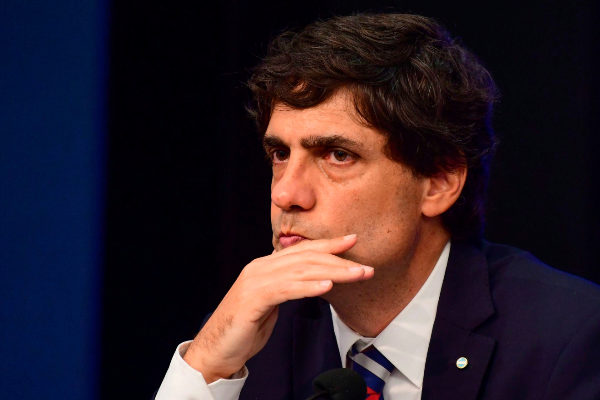- Argentina Alberto Fernández criticizes the IMF harshly and rejects the agreement
Amid strong political uncertainty and growing social tension, the Argentine government announced on Wednesday that it initiated a dialogue with the IMF to achieve a deferral of payments that generates relief to its external debt. The proposal, according to Finance Minister Hernán Lacunza, is a "reperfilation."
"The payments of the debt are still valid, they are not interrupted. It is a voluntary extension of terms of medium and long term payments. That is a repercussion," said the head of the Argentine economy, who took office ten days ago. The proposal does not include any removes and contemplates the payment of the corresponding interest, Lacunza said.
Lacunza's announcement came after a complex day in the financial markets . The peso was devalued by 2.5 percent to exceed the barrier of 60 pesos per unit - it was at 47 12 days ago - the country risk rose to 2,100 points and the Argentine shares listed on Wall Street and the securities of country debt.
"The Government seeks to clear the horizon of short, medium and long term of the financial program. This was done by the short-term liquidity stress and not by real problems of solvency of the Argentine debt," Lacunza emphasized.
"The priority of President (Mauricio) Macri is that there are no more devaluation rounds. The priority today is to guarantee stability. There are no possible reactivating measures if stability is not guaranteed beforehand," he insisted.
The Argentine economic-financial crisis is the daughter of a devilish political situation. Macri seeks reelection, but he found himself in the primary of August 11 with a 47 percent defeat against 32 against the Peronist candidate, Alberto Fernández, whom much of the country looks like as an elected president when two months to go the elections of October 27.
After meeting with IMF envoys, Fernandez launched a harsh statement Tuesday in which he accused the Washington-based entity and the Macri government of being both "responsible" for the "social catastrophe" that he understands the country is experiencing. The Argentine devaluation crisis, started in April 2018, brought the value of the dollar from 17.50 pesos to 60 in just 16 months, which contributed to trigger inflation, increase poverty and unemployment.
The Central Bank, commanded by Guido Sandleris, sold 669 million dollars in the last two days to avoid further devaluation of the peso. Fernández accuses the Central Bank and the government of giving away the reserves, and publicly spreads his fear of encountering the empty box if he is the new president as of December 10. After a few days in which Fernández and Macri eased the climate of uncertainty with two telephone conversations, relations between the government and the opposition returned to curl, partly due to the massive demonstrations on Saturday in support of Macri.
Amidst the economic and political tension, the center of Buenos Aires was in the morning of this Wednesday a chaos. Social organizations and leftist groups cut Avenida 9 de Julio, one of the main arteries of the city, making traffic there impossible. In addition, the subway unions announced a strike from nine o'clock at night and until the closing of the service.
According to the criteria of The Trust Project
Know more- Argentina
- Mauricio Macri
- IMF
Economy The Argentine crisis leaves 5,750 million euros of Spanish investment in the 'Macri era'
Argentina Alberto Fernández strongly criticizes the IMF and rejects the agreement
InternationalChange at the economic helm of Argentina: Minister Dujovne resigns

